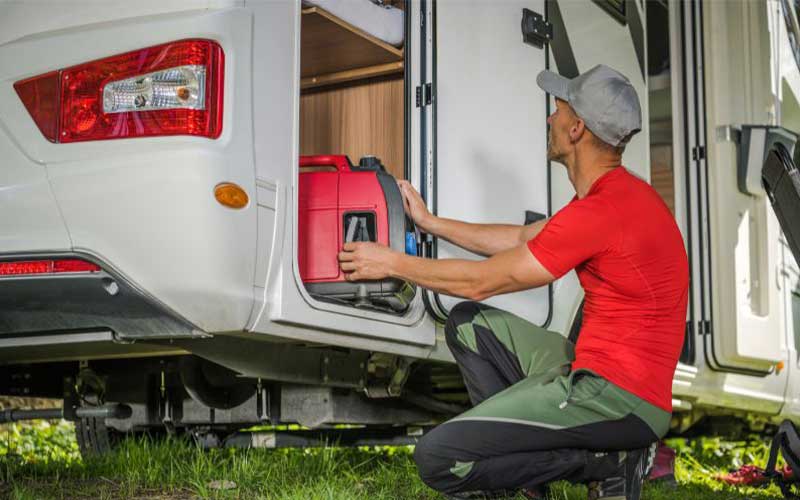
How Do RV Generators Work? Everything You Need to Know!
How Do RV Generators Work? Best Informational Guide 2023
If you are an avid traveler and love to explore the world with your RV, you must have wondered how your vehicle’s electrical systems are powered.
While your RV’s battery can run your lights and appliances for a while, it will eventually need a recharge. That’s where an RV generator comes in handy.
In this article, we’ll explore how RV generators work and what you need to know to get the most out of your generator.
What are RV Generators?
RV generators are portable power units that provide electricity to your RV’s electrical systems. They are typically powered by gasoline, propane, or diesel fuel and come in a variety of sizes to meet the power demands of different RVs.
An RV generator is a crucial component of your RV’s electrical system, as it can power everything from your air conditioner to your microwave when you’re on the road.
Types of RV Generators
Anyone who wants to enjoy the freedom of the open road without losing the comforts of home needs an RV generator. It enables you to run your air conditioner, charge your electronics, power your appliances, and even watch television.
There are various types of RV generators available, each with its own set of benefits and drawbacks. Here’s a deeper look at some of the most common.
1. Portable Generators
Portable generators are a popular choice for RVers because they are affordable, easy to use, and versatile.
They run on gasoline and are designed to be carried from place to place, making them ideal for camping trips.
Portable generators come in a range of sizes, from small units that can power a few devices to larger models that can power an entire RV.
2. Inverter Generators
Inverter generators are a type of portable generator that uses advanced technology to produce clean, stable power.
They are known for their fuel efficiency, quiet operation, and low emissions. Inverter generators are ideal for RVers who value portability and want a generator that won’t disturb their neighbors.
3. Hybrid Generators
Hybrid generators are a newer type of RV generator that combines the best of both worlds. They are designed to be fuel-efficient, quiet, and environmentally friendly, while also providing enough power to run an RV’s appliances.
Hybrid generators can run on gasoline, propane, or even solar power.
4. Diesel Generators
Diesel generators are a popular choice for RVers who want a reliable, long-lasting power source. They are known for their durability and efficiency, making them ideal for long trips.
Diesel generators are typically more expensive than other types of generators, but they are also more fuel-efficient and require less maintenance.
5. Propane Generators
Propane generators are a popular choice for RVers who want a cleaner, more eco-friendly option. Propane is a clean-burning fuel that produces fewer emissions than gasoline or diesel.
Propane generators are also quieter than other types of generators, making them a good choice for RVers who value peace and quiet.

How Do RV Generators Work?
RV generators generate electricity by converting mechanical energy. They work on the same fundamental principles as any other generator, but there are several significant peculiarities that make them perfect for use in an RV.
Here’s a more in-depth look at how RV generators work:
Components of an RV Generator
RV generators have four main components: fuel source, engine, alternator, and control panel. Let’s take a closer look at each of these components.
1. Fuel Source
RV generators can be powered by gasoline, propane, or diesel fuel. Gasoline generators are the most common and affordable, but they are also the least efficient.
Propane generators are more expensive but offer better fuel efficiency and produce fewer emissions. Diesel generators are the most efficient but also the most expensive.
2. Engine
The engine is the heart of your RV generator, and it is responsible for converting fuel into mechanical energy.
RV generators typically have small engines, ranging from 2.5 to 12 horsepower, depending on their size and power output.
3. Alternator
The alternator is responsible for converting the mechanical energy produced by the engine into electrical energy.
The alternator consists of a rotor and a stator, which work together to generate an electrical current.
4. Control Panel
The control panel is where you can monitor and control your RV generator’s operation. It includes features such as a start/stop switch, fuel gauge, circuit breaker, and voltage meter.
5. Electrical Output
RV generators produce alternating current (AC), which is similar to the electricity you get from your home’s power outlet.
The output voltage of an RV generator varies depending on the model and size, but most generators produce 120 volts of AC power.
6. Sizing Your RV Generator
The size of your RV generator depends on the power demands of your RV’s electrical systems. To determine the size of the generator you need, you’ll need to add up the wattage of all the appliances and electronics you plan to power simultaneously.
Once you have this total wattage, you’ll want to add a margin of safety to ensure your generator can handle peak loads.
7. Maintenance
Proper maintenance is essential to keep your RV generator running smoothly. You’ll need to perform regular oil changes, filter replacements, and spark plug changes, depending on the manufacturer’s recommendations.
It’s also essential to keep your generator clean and free of debris, as this can affect its performance.
Once you’ve chosen your RV generator, it’s important to keep it in good working order. Regular maintenance can help ensure that your generator runs smoothly and lasts for years. Here are some tips for maintaining your RV generator:
- Change the oil regularly
- Check and replace air and fuel filters
- Keep the generator clean and free of debris
- Run the generator regularly, even when you’re not using it
- Store the generator properly when not in use
8. Safety Tips
RV generators can be dangerous if not used properly, so it’s essential to follow some safety tips to keep yourself and your RV safe.
First, always read the manufacturer’s instructions and follow them carefully. Never operate your RV generator indoors or in an enclosed space, as this can lead to carbon monoxide poisoning.
Make sure your generator is placed on a flat surface away from any combustible materials. Lastly, always turn off your generator before refueling it.
9. Troubleshooting
If your RV generator isn’t working correctly, there are a few things you can check before calling in a professional.
First, check the fuel level and make sure the fuel valve is open. Next, check the oil level and make sure it’s not too low. Lastly, check the air filter and make sure it’s clean and free of debris.
Advantages and Disadvantages of RV Generators
RV generators come with several advantages and disadvantages that you should consider before purchasing one.
RV generators provide several advantages, including mobility, adaptability, and the ability to supply electricity even while you are off the grid.
However, there are several negatives to RV generators, including as noise, pollutants, and maintenance requirements.

How Do RV Generators Work?
RV generators work by converting mechanical energy into electrical energy. They operate on the same basic principles as any other generator, but there are some key differences that make them ideal for use in an RV. Here’s a closer look at how RV generators work:
How to Calculate Your Needs?
Watts ÷ Volts = Amps
Amps x Volts = Watts
| Appliance | Load Range (Watts) | Avg. Load (Watts) | Amps |
|---|---|---|---|
| Air Conditioner | 1400 – 2000 | 1700 | 14 |
| Coffee Maker (Keurig) | 200 – 1500 | 200 -400 | 9.5 – 20.5 |
| Hair Dryer | 800 – 1800 | 1000 | 15 |
| Microwave | 650 – 1000 | 1000 | 7.5 – 13 |
| Refrigerator | 600 – 800 | 800 | 2 – 8 |
| Water Heater | 1000 – 1500 | 1250 | 9 -13 |
Factors to Consider When Choosing an RV Generator
1. Power Output
The first thing to consider when choosing an RV generator is the power output. You’ll need to choose a generator that can provide enough power to run all of your appliances and devices.
The power output is measured in watts, and you’ll need to calculate how many watts you’ll need to power your RV.
2. Fuel Efficiency
Fuel efficiency is another important factor to consider when choosing an RV generator. A fuel-efficient generator will save you money on gas or propane, and it will also reduce your environmental impact.
Look for a generator with a high fuel efficiency rating, especially if you plan on taking long trips.
3. Noise Level
Noise level is an important consideration for RVers who value peace and quiet. Some generators are very loud and can disturb your neighbors or wildlife.
Look for a generator with a low decibel rating, especially if you plan on camping in areas with noise restrictions.
4. Portability
Portability is another important factor to consider when choosing an RV generator. You’ll want a generator that is easy to transport and store.
Look for a generator that is lightweight and compact, with handles or wheels for easy maneuverability.
5. Price
Price is always a consideration when buying any piece of equipment, and RV generators are no exception.
Generators can range in price from a few hundred dollars to several thousand dollars.
Consider your budget when choosing a generator, but also keep in mind that a higher-priced generator may save you money in the long run with its fuel efficiency and durability.

FAQs:
Q1: How long can an RV generator run continuously?
Most RV generators can run continuously for 8-12 hours, depending on the fuel type and load.
Q2: Can I use my RV generator to power my home?
While it’s possible to use an RV generator to power your home, it’s not recommended. RV generators are designed for portable use and may not be powerful enough to meet your home’s power demands.
Q3: How often should I change the oil in my RV generator?
The oil in your RV generator should be changed every 100 hours of use or at least once a year, whichever comes first.
Q5: How do I know what size generator I need for my RV?
To determine the size of the generator you need, you’ll need to add up the wattage of all the appliances and electronics you plan to power simultaneously. Once you have this total wattage, you’ll want to add a margin of safety to ensure your generator can handle peak loads.
Q6: Can I run my RV generator while driving?
No, it’s not safe to run your RV generator while driving. Your generator should only be operated when your RV is parked and stationary.
Conclusion
Finally, RV generators are an important part of your RV’s electrical system since they provide electricity when you’re on the road. Understanding how they function and how to properly repair them is critical to keeping your RV in good working order.
You can guarantee that your RV generator will give you with reliable electricity for years to come by following the safety precautions, appropriately sizing your generator, and conducting regular maintenance.
- No Comments
- May 3, 2023
